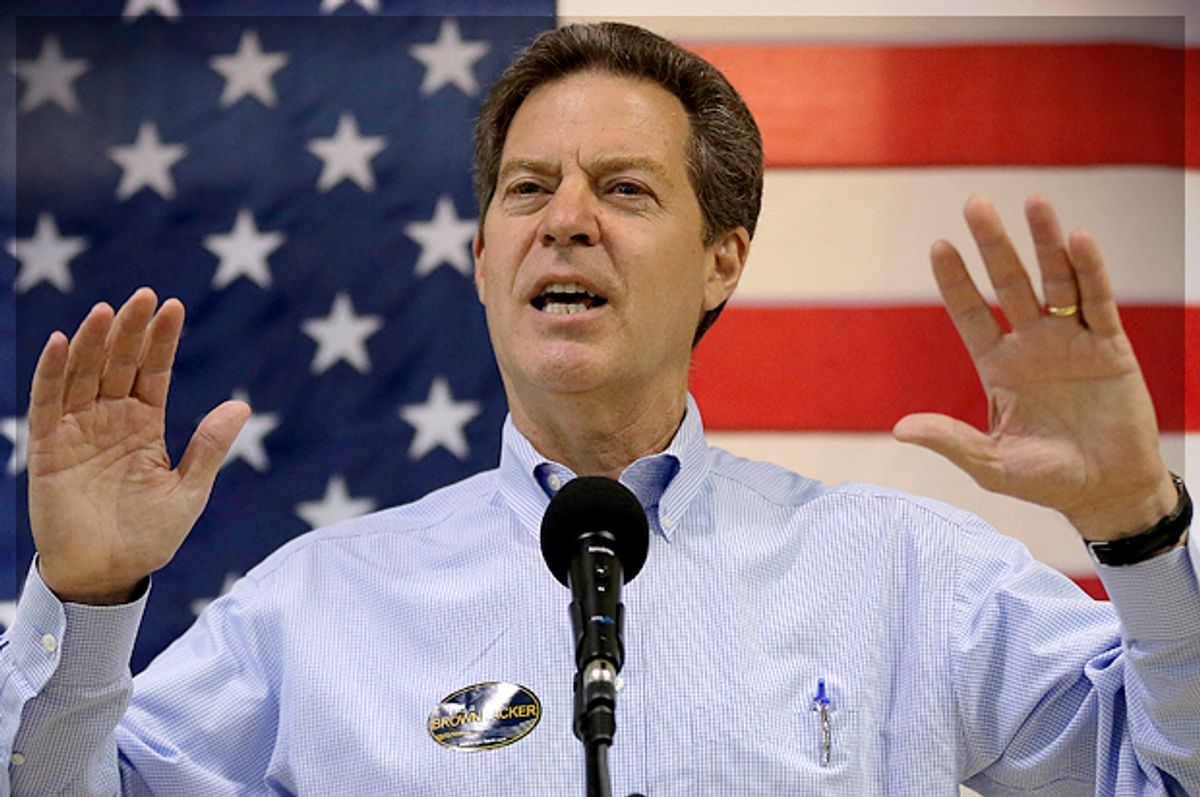In a private ceremony this week, flanked on both sides by anti-choice activists and posterboard-sized photos of fetuses, Republican Kansas Gov. Sam Brownback signed a law banning what doctors say is the safest technique used for second-trimester abortions. Kansas is the first state to outlaw the method known as dilation and evacuation, which lawmakers have renamed “dismemberment abortion.”
If the name sounds distractingly gruesome to you, that’s by design. The legislation isn’t an invention out of Kansas, it was drafted by the National Right to Life Coalition, the same anti-choice organization that brought you the “partial-birth” abortion ban and the early aughts culture wars that came with it.
Now with “dismemberment abortion,” anti-choice activists are hoping for a repeat, pushing identical measures in other states. And while the broader strategy is very much national, Brownback is using his state’s new restriction -- and its status as one of the most hostile states to abortion rights -- to distract from a ballooning deficit, crumbling infrastructure and struggling schools. His office announced Tuesday that the governor will stage multiple public reenactments of the signing throughout the rest of the month.
“The Unborn Child Protection From Dismemberment Abortion Act is the first of what we hope will be many state laws banning dismemberment abortions,” Carol Tobias, president of National Right to Life, told the New York Times. “This law has the power to transform the landscape of abortion policy in the United States.”
That transformation has already started. Similar measures are winding their way through Oklahoma, Missouri, South Carolina and South Dakota. And in the law’s name alone, abortion rights opponents have succeeded in setting the terms of the narrative, which is the same strategy the movement used to pass the federal “partial birth” ban more than a decade ago.
Whether or not it survives a court challenge, the unsubtly titled Unborn Child Protection From Dismemberment Abortion Act is in the ether. The word “dismemberment” was hand selected by National Right to Life Coalition because it recognized that -- whether in support or critique -- the public would be repeating it many times over, and that’s precisely what’s happening.
“It’s not about if it’s safe, if it’s a standard, not about if there’s evidence,” Dr. Anne Davis, a second-trimester abortion provider, associate professor of clinical obstetrics and gynecology at Columbia University Medical Center and consulting medical director at Physicians for Reproductive Health, told Salon. Dilation and evacuation is the safest and most common method used for abortion in the second-trimester, and accounts for around 9 percent of abortions performed in Kansas.
That tactical shift in focus -- from safety and medical consensus to non-medical language -- has had a negative impact on patients, Davis explained. “When the new bill [in Kansas] came along, many of us, me included, had the instant thought bringing us back to the PBA ban [the federal “partial birth” ban],” she said. “The clear parallel is to take a medical procedure and use non-medical language as a shock technique. They are shockaholics.”
“And I’ve seen a very clear evolution in my patients. The main concerns were about recovery: What’s it going to be like, do I need to take time off work? But what has happened in the last 20 years is we have progressively moved to questions about the fetus... people have really internalized this language."
Julie Burkhart, the chief executive of the Trust Women Foundation and the South Wind Women’s Center in Wichita, has said that her organization is considering a legal challenge, telling the Times that the law is the “physician intimidation and criminalization act.”
National abortion rights groups are also monitoring the law, and calling it the first step in a coordinated national effort to criminalize abortion. “We have serious constitutional concerns with this bill, which is just another attempt by extremists to choke off access to safe and legal abortion,” Amanda Allen, state legislative counsel at the Center for Reproductive Rights, said in an email comment to Salon. “The groups who lobbied for this cynical attack on constitutionally protected health care are the same organizations pushing measures that deny women access to care earlier in pregnancy, when the vast majority of women seek abortion services.”
Allen said that the strategy is to use “graphic, non-medical terminology” to ban abortion in the second trimester: “Make no mistake, this is part of a coordinated effort to end safe and legal abortion in this country.”
Brownback's office hasn't been shy about its ambitions for the law outside the state. “This is a horrific procedure,” Brownback spokesman Eileen Hawley said. “He hopes the nation follows suit.”



Shares